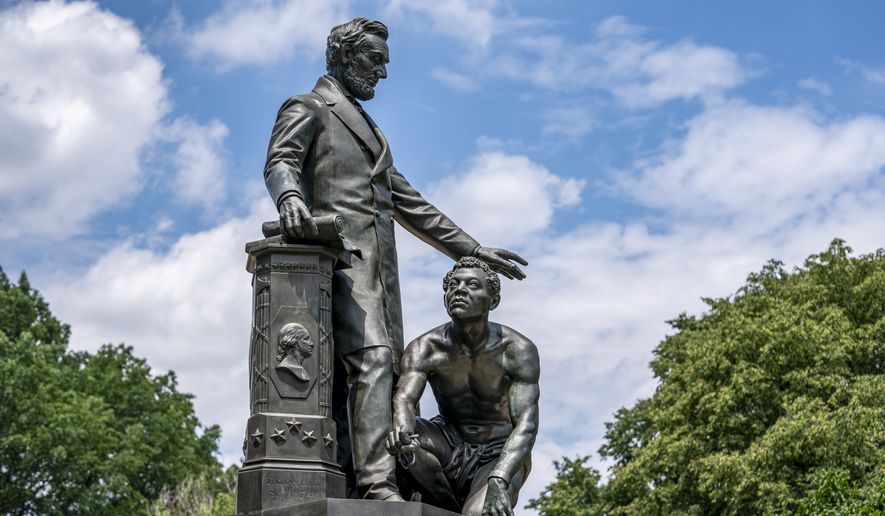Black conservatives on Tuesday kicked off a campaign to save the Emancipation Memorial, the statue of Abraham Lincoln and freed slave Archer Alexander now under attack by Democrats and Black Lives Matter protesters in the District.
Star Parker, founder of the nonprofit UrbanCURE, held an “emancipation celebration” Tuesday at Lincoln Park, site of the now fenced-off bronze statue on the Capitol Hill, to promote a petition drive urging Congress to “keep this statue alive, right here.”
“This Emancipation Memorial should be a reminder to never to see any group — any group — of persons as non-persons, whether born or unborn, and that America’s history is best relayed by reality, not revised by mob mentality,” Ryan Bomberger, founder of the educational nonprofit Radiance Foundation, said at the event.
Delegate Eleanor Holmes Norton has called for removing the statue, which was erected in 1876 and also is known as the Freedman’s Memorial, tweeting June 23 that its designers “didn’t take into account the views of African Americans.”
Mrs. Norton, the District’s nonvoting congressional representative, said she would introduce a bill to move the statue to a museum, but Ms. Parker said that its critics “need to learn Black history.”
“Archer Alexander is not kneeling; as a track star prepared to run a dash, the kinetic motion in this figure shows him just emancipated to stand and run his race as a free man,” Ms. Parker said in a statement
We’re live, trying to save the Emancipation Memorial from destruction by leftists in Washington, DC: Watch Live Now > https://t.co/sLm88MqKP0 pic.twitter.com/yzKXrj9v2R
— Star Parker ⭐🇺🇸 (@StarParker) July 14, 2020
According to the petition, funding for the statue began with a $5 donation from former slave Charlotte Scott of Virginia. The initial funds were raised by former slaves that later were matched by donations from the Western Sanitary Commission in St. Louis. The sculptor, Thomas Ball, used Alexander as the model after other freedmen pushed to have the statue depict an actual freed slave’s likeness.
Critics argue that the statue shows a chained slave in a subservient position to a “white savior.”
Supporters point out that the shackle is broken, the kneeling man is rising and the statue was dedicated by Black abolitionist Frederick Douglass.
“This Freedman’s Statue should not only remain standing in Lincoln Park, but this is the sacred location where President Trump should place the new Memorial Park he envisions to honor great American heroes who worked tirelessly to unify the faces,” Ms. Parker said.
The Boston Art Commission voted unanimously last month to remove a replica from Park Square, where it has stood since 1879, over criticism that the memorial was demeaning and failed to reflect the role of Black Americans in fighting for emancipation.
Mr. Bomberger accused the commission of trying to “purge history,” saying that tearing down statues “is about suppressing and controlling speech, whether historical or present.”
“Slavery cannot tolerate free speech, amen, but neither can progressivism, neither can LGBTQ activism, neither can pro-abortion feminism, neither can a Marxist Black Lives Matter movement,” Mr. Bomberger said. “Instead of tearing down statues, our culture needs to build up biblical statutes, like loving one another, forgiving one another, and understanding that from one blood, God created us all.”
Ms. Parker said the first step is to collect at least 10,000 petition signatures and present them to Congress, “so that they know there is opposition, that Republicans know there are people who want to preserve the statue, because I’m sure we already know what will happen with all of the Democrats.”
She said the second step would be to appeal to the White House to use the location for the Memorial Park recently proposed by President Trump.
Others involved in the effort include Robert Woodson of the Woodson Center, Tea Party Patriots, FreedomWorks, Heritage Action, Americans United for Limited Government, Virginia Women for Trump and the American Family Association.
• Valerie Richardson can be reached at vrichardson@washingtontimes.com.




Please read our comment policy before commenting.